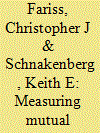| Srl | Item |
| 1 |
ID:
186193


|
|
|
|
|
| Summary/Abstract |
We analyze the design of an international climate agreement. In particular, we consider two goals of such an agreement: overcoming free-rider problems and adjusting for differences in mitigation costs between countries. Previous work suggests that it is difficult to achieve both of these goals at once under asymmetric information because countries free ride by exaggerating their abatement costs. We argue that independent information collection (investigations) by an international organization can alleviate this problem. In fact, though the best implementable climate agreement without investigations fails to adjust for individual differences even with significant enforcement power, a mechanism with investigations allows adjustment and can enable implementation of the socially optimal agreement. Furthermore, when the organization has significant enforcement power, the optimal agreement is achievable even with minimal investigative resources (and vice versa). The results suggest that discussions about institutions for climate cooperation should focus on information collection as well as enforcement.
|
|
|
|
|
|
|
|
|
|
|
|
|
|
|
|
| 2 |
ID:
134459


|
|
|
|
|
| Summary/Abstract |
This study explores the relationships between state violations of different human rights. Though most quantitative studies in international relations treat different types of repressive behaviors as either independent or arising from the same underlying process, significant insights are gained by conceptualizing different human rights violations as separate but dependent processes. We present a theoretical framework for conceptualizing the mechanisms relating human rights practices and produce a novel measurement strategy based on network analysis for exploring these relationships. We illustrate high levels of complementarity between most human rights practices. Substitution effects, in contrast, are occasionally substantial but relatively rare. Finally, using empirically informed Monte Carlo analyses, we present predictions regarding likely sequences of rights violations resulting in extreme violations of different physical integrity rights.
|
|
|
|
|
|
|
|
|
|
|
|
|
|
|
|
| 3 |
ID:
168523


|
|
|
|
|
| Summary/Abstract |
Lobbying is a potential source of corruption but is also a valuable source of information for policy-makers. We analyze a game-theoretic model that shows how the threat of corruption affects the incentives of noncorrupt politicians to enlist the help of lobbyists to make more informed decisions. Politicians face a dilemma because voters cannot always tell whether a politician allows access to lobbyists to solicit corruption or to seek information. Thus, a noncorrupt politician may deny access to lobbyists to signal that she is noncorrupt even though doing so impedes her ability to make good policy. This signaling may decrease the welfare of the voters depending on the value of the lost policy information relative to the value of screening out corrupt politicians.
|
|
|
|
|
|
|
|
|
|
|
|
|
|
|
|